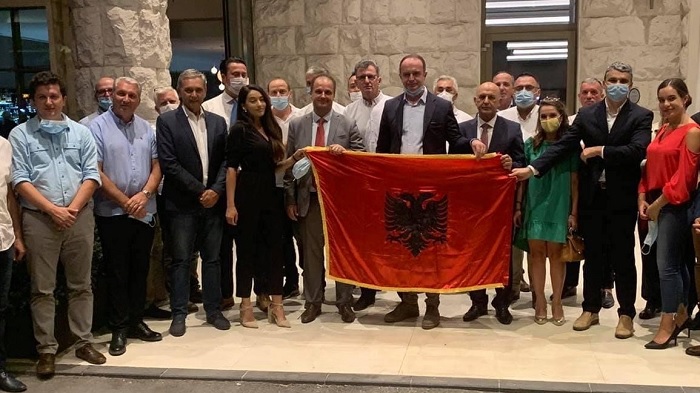
Nik Gjeloshaj tells BIRN that Montenegro’s national minorities can fight for their goals better inside the government, signaling an end to years of cooperation with the once-ruling Democratic Party of Socialists
Parties representing Montenegro’s national minorities must be part of the new government as the best way of protecting their national interests following a watershed August election, a prominent ethnic Albanian leader in the country has told BIRN.
In a boost to the three main political blocs working to form a new government, Nik Gjeloshaj, leader of the ethnic Albanian coalition The Time is Now said Albanians were ready to join the negotiations that would, if successful, confine the Democratic Party of Socialists, DPS, to the opposition benches for the first time in three decades.
“I think that only through participation in government and state institutions, where important things are decided, Albanians can prevent bad decisions and so we as Albanian representatives can contribute to improving them,” Gjeloshaj, 41, said in an interview with BIRN.
Leaders of the three main blocs that together hold 41 of parliament’s 81 seats after the August 30 election has called on Montenegro’s national minorities to join them. Some, however, are wary given that the largest bloc, For the Future of Montenegro, contains strongly pro-Serbian and pro-Russian nationalist figures who previously opposed Montenegro’s break from its state union with Serbia in 2006.
Montenegro’s ethnic Albanians, in particular, have little desire to be drawn back into Serbia’s orbit two decades after NATO went to war to halt a wave of ethnic cleansing and killings by Serbian security forces in predominantly ethnic Albanian Kosovo, then a southern province of Serbia but since 2008 an independent state.
Gjeloshaj said some members of For the Future of Montenegro would have to work hard to gain the confidence of Montenegro’s national minorities. “Deeds are important to us, not just words,” he said.
“Especially when talking about politics, which is a delicate area, and the future of the one nation we represent.”
“Possible negotiations will show whether the invitation of the new majority was of a formal nature or whether they are ready to accept our demands, which are in line with democratic standards and international conventions.”
“Our coalition negotiating platform will contain basic program principles that represent the principles of Albanian national parties,” Gjeloshaj added.
“If we reach an agreement about our program principles, for their implementation we must have representatives in state institutions. But above all, the principles are the priority.”
Minorities ready to abandon DPS
The Time is Now and Unanimously, both ethnic Albanian coalitions, hold one seat each in parliament. A mathematics teacher by trade, Gjeloshaj became a local political star in March 2019 when he was elected the first mayor of the restored municipality of Tuzi, his native town near the border with Albania. Tuzi once enjoyed the status of a municipality but lost it in 1957 when Montenegro was part of the federal Yugoslavia.
Administered as an outlying district of the capital, Podgorica, Tuzi’s 3,000 inhabitants long wanted to run their own affairs again. After much pressure, the government restored Tuzi’s municipal status in 2018.
The three main opposition blocs negotiating to form the government have pledged to honor Montenegro’s international commitments, such as membership of NATO, and to keep the country on the path to membership of the European Union, goals that are strongly supported by the ethnic Albanian minority. They have also given assurances that Montenegro will not reverse its recognition of Kosovo as an independent.
Gjeloshaj’s call for cooperation follows that of the party representing the Bosniak minority with three seats in parliament. Other ethnic Albanian representatives have also said they are open to negotiations.
Montenegro is a multi-ethnic state unusual in the Balkans in having no overwhelmingly dominant community. Some 45 percent of the country’s 650,000 people identify as Montenegrin, 29 percent as Serb, 4.9 percent as Albanian and 8.6 percent as Bosniak.
For years, Bosniaks and Albanians in parliament allied with the DPS in government.
At the end of last year, Andrija Mandic, a prominent Serb leader in For the Future of Montenegro, accused minority parties of complicity in what he said were state policies against Serbs under the DPS and its leader, President Milo Djukanovic.
The remark came at a moment of great controversy, with minority parties voting with the DPS in passing a law on religious freedom that Serbs and the Serbian Orthodox Church say is designed to strip the Church of its property, triggering months of street protests that rocked the government. After the election, Mandic called on minority parties to join the new majority in parliament.
With the DPS calling on them to join the opposition, Gjeloshaj said Albanian parties would decide their own political path.
“We continue to fully share foreign policy goals with the DPS and to care for Montenegro’s path,” he said, “but we believe that we can fight better and stronger around our program goals within the executive branch.”
He stressed that Albanian parties retained the strong support of neighboring Albania, Kosovo and “strategic partner” US.
“What needs to be emphasized is that everyone is responsible for their decisions and it is very important to us that our decisions are compatible with the views of strategic partners,” he said.
“We have great cooperation with Kosovo and Albania representatives, and it will get better every day. We do not interfere in their decisions for which they take responsibility, and so far they have not interfered in our decisions, for which we take responsibility.”
 Eurasia Press & News
Eurasia Press & News


